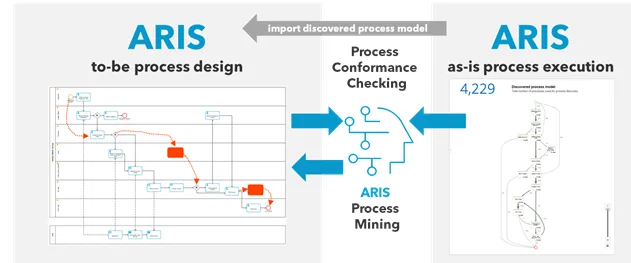“Are we following our processes?” – ARIS Process Mining will answer this question
Blog: Aris BPM Blog
Have you invested time in mapping and designing your business processes? Have you wondered whether your colleagues responsible for these processes are following the prescribed way of working? ARIS Process Mining can help you reach the next level of process maturity, helping you to understand where the gaps are that require adjustments to the design, the underlying systems, or the need for additional training and documentation for your colleagues.
Ensure your organization operates as it should
Why bother with process compliance?
To be successful in the marketplace, you must comply with legal and economic regulations, and meet your customers’ requirements. If compliance regulations or requirements are not met, you face legal and contractual sanctions, especially if you operate in highly regulated industries such as banking, medical or pharmaceuticals. Not only that, if you fail to meet customer expectations, you risk damaging the client relationship and ultimately may lose the customer. Therefore, it is important to ensure that each of your process executions comply with your defined business processes and work procedures.
How do you ensure process compliance?
There are three strategies that you can implement to ensure process compliance:
1. Compliance by design
Map your processes and use these blueprints for optimization, standardization and certification purposes. Process blueprints can be used not only for implementation, but also for the introduction of process knowledge and procedural instructions in your company so that all employees know how to operate. As an ARIS customer, you have already established an important foundation for ensuring process compliance by defining your business processes in a structured repository and rolling them out company-wide via your ARIS process portal. However, your strategy for process compliance should not solely rely on documenting your processes; you also need to keep an eye on process execution.
2. Regular compliance audits
Based on the analysis of a sample of executed processes, auditors verify and certify your process compliance. This periodic compliance analysis ensures that your defined processes are adhered to and enables reactive actions in the event of deviations. However, this approach is applied only sporadically, e.g. once a quarter. Using only snapshots during a certain period does not guarantee continuous adherence to the processes, and does not enable timely countermeasures if anything gets out of control. It is not uncommon for actual compliance to rise shortly before the start of an audit and then drop significantly again after it is done: This is clearly not your desired goal.
3. Compliance at runtime
Since the execution of a process can vary from case to case, analyzing realistic system data using process mining is the only way to achieve an effective and targeted compliance strategy. Only continuous monitoring of compliance immediately after processes are executed, or even during runtime, allows you to ensure continuous process compliance, quickly identify vulnerabilities, and take proactive action to improve compliance. Process Conformance Checking powered by ARIS Process Mining guarantees such a continuous and fact-based analysis.
ARIS Process Mining for process conformance checking
Process Mining is a technology that automatically reconstructs actual process execution and calculates associated process KPIs. For this process discovery, you need the data from applications running the processes to be analyzed. More specifically, you need the following data snippets of your process traces that are essential for a process flow:
- Process ID: To group all process traces that belong to the same process instance, e.g. your order ID.
- Function name: To name all your executed process activities, e.g. “Create Purchase Requisition.”
- Timestamp: To sort your process cut-outs according to their actual execution order.
Once you have this type of information at your fingertips, you're just minutes away from getting your first fact-based process insights with ARIS Process Mining.
In addition to process discovery, you can benefit from Process Conformance Checking, which compares the actual process execution with the underlying process definition, e.g. based on BPMN models. Thanks to our algorithms in ARIS Process Mining, you can see not only your aggregated process compliance rate, i.e. the percentage of process instances that match your process design, but also the detailed compliance issues that led to non-compliance. An example of such a compliance problem would be that you do not start a purchasing process with the creation of a purchase requisition, but you start directly with placing an order. Our intelligent algorithms find not only faulty process starts or ends, but also unexpected process steps or non-compliant execution sequences.
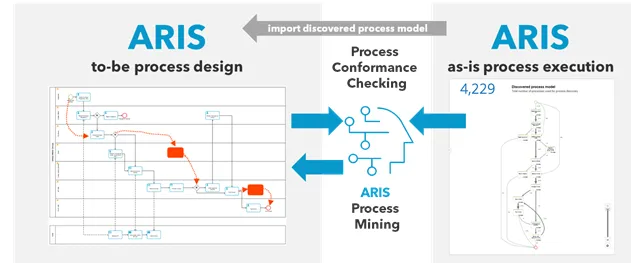
There are numerous use cases that make process compliance checking a truly powerful application:
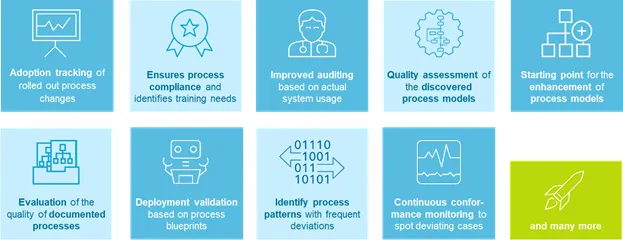
Typical questions that can be answered by ARIS Process Mining
Do our employees adapt their way of working to the process changes made and rolled out worldwide? Are there any specific locations where additional training on the changes is required
As the leading tool for process design and analysis, ARIS enables you to adapt your business processes, ensure a controlled release cycle of your changes by the responsible process owners and roll out the adapted processes globally to the entire workforce with the appropriate representations. Our confirmation management also ensures that all employees affected by process changes can confirm that they have read and understood the changes to ensure that they can act in compliance.
But that's not all - ARIS Process Mining can also make the actual adoption rate visible and allows you to analyze it from different perspectives. In this way, you can identify weaknesses, such as certain regions have difficulty adapting to the changes made by a newly introduced application system. Based on these findings, you can take appropriate action directly within ARIS. For example, you can trigger training initiatives to enable your employees to perform adapted processes correctly. Our tight integration with the leading training authoring tool, SAP® Enable Now, also ensures that the right training materials are created to meet business requirements.
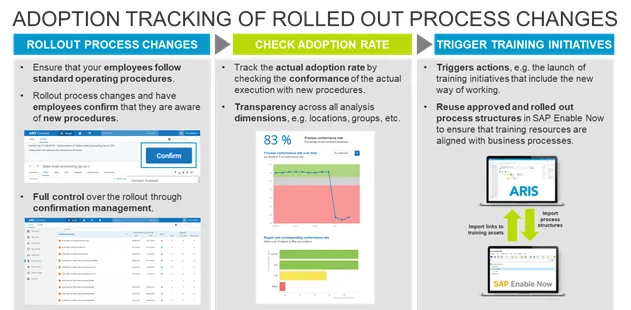
ARIS Process Mining not only covers the human, but also the technical side of process conformity. In this context, many customers struggle with questions such as:
We implemented our business logic into the new SAP® S/4HANA system according to the process blueprint. How can we ensure that the application is running as it should and validate the deployment?
The main difference to checking the previously discussed process adoption rate is that the success of a system rollout (and thus of a process rollout) is measured. This enables you to identify potential instability in newly implemented or revised application systems in the early stages of your implementation project. Completely new system implementations, as well as upgrades and consolidations (re-implementation of a process) of existing systems, can be examined. Essentially, it is about validating that the system behaves as desired and supports the right way of working according to the process blueprint and other functional requirements.
ARIS offers you extensive options for designing your process blueprint, synchronizing it directly with SAP Solution Manager for implementation or exporting it as a BPMN file. Thanks to our first-class BPMN compatibility (http://bpmn-miwg.github.io/bpmn-miwg-tools/), ARIS offers you extensive implementation scenarios. With ARIS Process Mining, you can analyze and validate the system implementation and identify problems. These problems can be caused by incorrect or incomplete configurations, user workarounds or misinterpreted requirements. But even the blueprint may not represent the desired implementation. In this way, you can test the effectiveness of the implementation as quickly as possible after a rollout and immediately incorporate the results into the global template when you move to the next region or country. This will accelerate the implementation process and increase the success rate, which will have a positive impact on time and budget constraints.
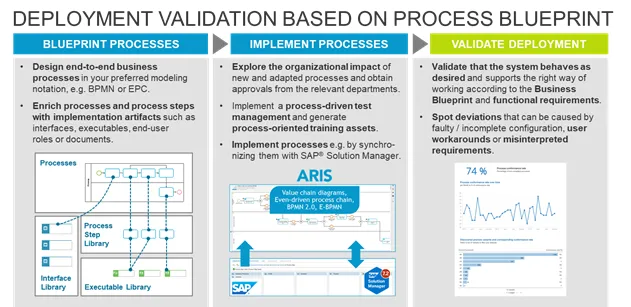
Another common question we hear from customers, particularly in the Center of Excellence, is:
How does the process documentation reflect reality? What changes do we need to make to improve model quality?
ARIS Process Mining lays the foundation: It shows all deviations in your process execution from your documented processes. Based on these identified compliance issues, you can decide whether it is an actual incident that needs to be addressed from an organizational or technical point of view, or whether it is a valid way of working that is not yet covered in the process documentation. This could also be a workaround established by a specific department or region that you want to incorporate as a global standard in your process template. With ARIS’ smart modeling capabilities, adapting your process design is easier than ever. Changed processes can then be seamlessly approved in ARIS and rolled out across your organization. The colleagues responsible for the affected processes will clearly see the deviations from the previous version through our latest model comparison capabilities. It shows all changes and explains them.
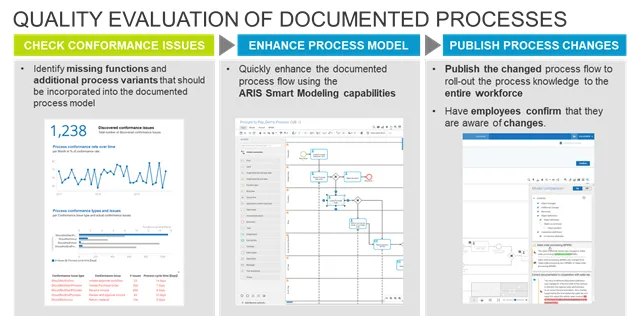
It has never been easier for employees to learn about and comply with new regulatory changes, business changes or process optimizations.
Check your compliance NOW!
- Leverage your process repository for compliance checking.
- If you are not yet using ARIS or do not have process models in place that correspond to your discovered process, don't worry! Simply import your discovered processes into the ARIS repository.
- Identify process inefficiencies and compliance issues by tracking adoption rates and overall process compliance.
- Improve your process documentation by identifying missing functions and additional process variants.
For more information check our recent webinar.
For more information on ARIS Process Mining visit www.processintelligence.com
